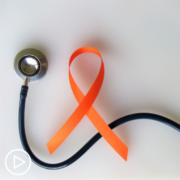Refractory vs Relapsed CLL: What’s the Difference?
Refractory vs Relapsed CLL: What’s the Difference? from Patient Empowerment Network on Vimeo.
What is the difference between refractory and relapsed CLL? Dr. Catherine Coombs, a CLL expert from UNC Lineberger Comprehensive Cancer Center, explains.
Dr. Catherine Coombs is an Assistant Professor of Medicine in the Division of Hematology at The UNC Lineberger Comprehensive Cancer Center. Learn more about Dr. Coombs here.
Related Resources:

|

|

|
Transcript:
Katherine:
We received an audience question prior to the program. They asked, “What does it mean to be refractory, and how is that different from relapsing?”
Dr. Coombs:
I actually just had a conversation about this. I’m not sure that’s formally defined. I have heard one definition suggested is – I think everyone agrees refractory means you did not respond to your last therapy. That’s actually really bad. Most of our therapies work in almost everyone. So, refractory is a term that is generally accepted means no response. So, whatever therapy you’re on, the CLL did not get better, it got worse. That’s refractory.
Another definition that I’ve heard based on this recent discussion is if you had a short remission duration, such as six months or shorter. Most of the therapies we use should work for quite a while, usually on the order of years. So, some people also consider refractory a short remission duration, six months or shorter.
Relapse is probably the more common scenario. That’s a patient who has had some type of therapy, but they had a decent response, but that response wore off, more on a normal pace. Again, not on the order of months, but usually on the order of years.










